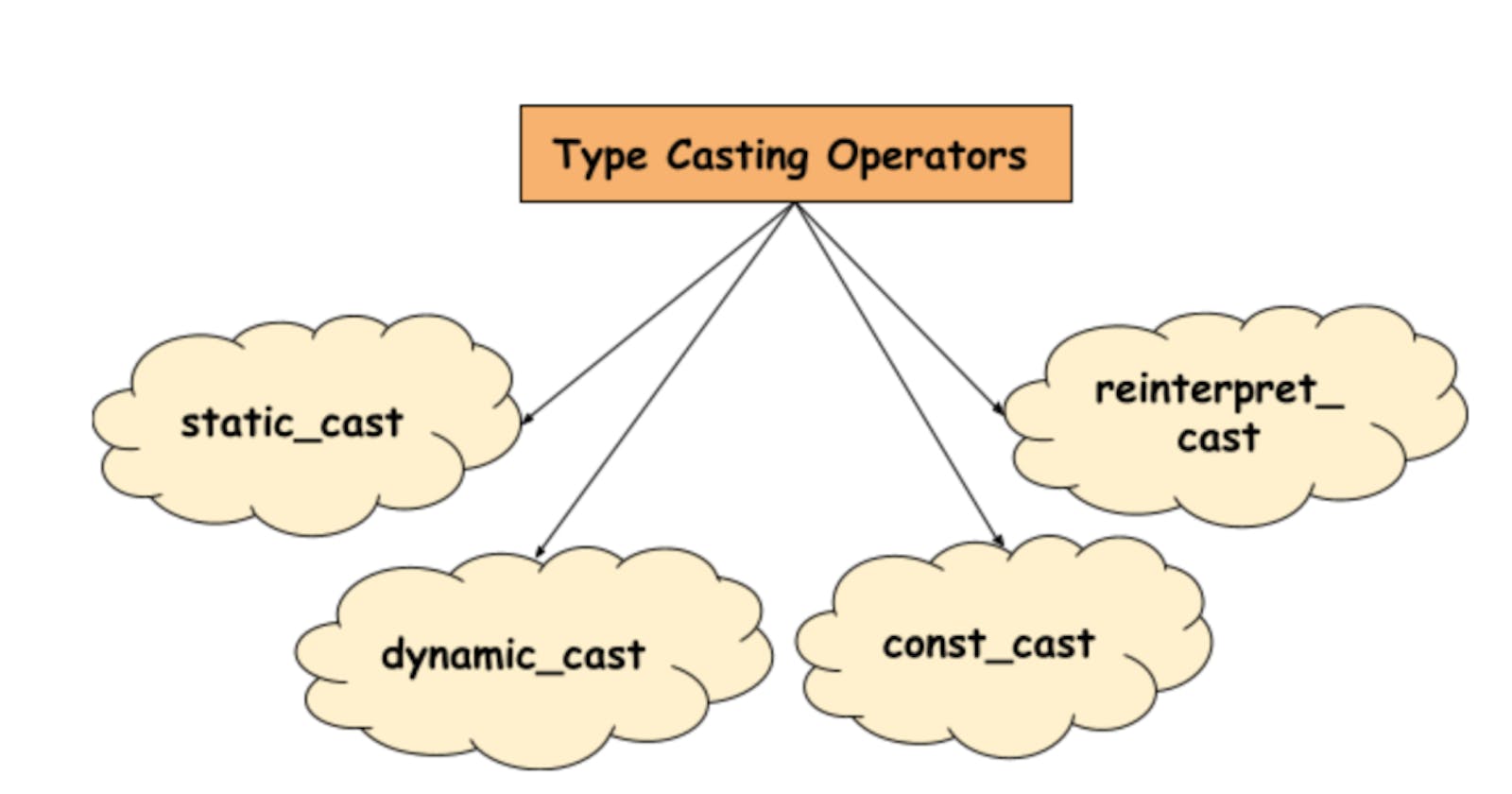Introduction 💡
C++ is a powerful programming language that allows developers to build complex and efficient applications. One of the key features of C++ is its ability to perform various types of casting, which allow developers to convert data from one type to another. In this blog post, we will explore the four main types of casting in C++: static_cast, reinterpret_cast, dynamic_cast, and const_cast.
I will explain each type of casting in detail and provide examples of how they can be used in practice.
Let's Go 🚩
Static_cast
The static_cast is a type of casting that is used to convert one type of data to another. This casting is used when the types being converted are related in some way. For example, a float can be converted to an int, and an int can be converted to a long. The syntax for static_cast is as follows:
static_cast<new_type>(expression)
In this syntax, new_type is the type of data that you want to convert to, and expression is the data that you want to convert. Here is an example:
float f = 3.14159;
int i = static_cast<int>(f);
In this example, we convert the float variable f to an integer using static_cast. The result is stored in the integer variable i.
Static_cast can also be used to convert between pointers and references. For example:
int i = 10;
void* ptr = static_cast<void*>(&i);
In this example, we convert the pointer to the integer variable i to a void pointer using static_cast.
Reinterpret_cast
The reinterpret_cast is a type of casting that is used to convert one type of data to another. This casting is used when the types being converted are unrelated or incompatible. For example, you can use reinterpret_cast to convert a pointer to an integer to a pointer to a float. The syntax for reinterpret_cast is as follows:
reinterpret_cast<new_type>(expression)
In this syntax, new_type is the type of data that you want to convert to, and expression is the data that you want to convert. Here is an example:
int i = 10;
float* ptr = reinterpret_cast<float*>(&i);
In this example, we convert the pointer to the integer variable i to a pointer to a float using reinterpret_cast.
Reinterpret_cast should be used with caution as it can result in undefined behavior if used incorrectly. It is typically used when working with low-level system programming or when dealing with type punning.
Dynamic_cast
The dynamic_cast is a type of casting that is used to convert one type of data to another in the context of polymorphism. Polymorphism is the ability of objects of different classes to be treated as objects of a common base class. The dynamic_cast is used to convert a pointer or reference to a base class to a pointer or reference to a derived class. The syntax for dynamic_cast is as follows:
dynamic_cast<new_type>(expression)
In this syntax, new_type is the type of data that you want to convert to, and expression is the data that you want to convert. Here is an example:
class Base {
public:
virtual void foo() {}
};
class Derived : public Base {
public:
void foo() override {}
};
int main() {
Base* base_ptr = new Derived;
Derived* derived_ptr = dynamic_cast<Derived*>(base_ptr);
}
In this example, we create two classes, Base and Derived. Derived is a subclass of Base, and it overrides the foo() function. We then create a pointer to a Base object and assign it to a new Derived object. Finally, we use dynamic_cast to convert the pointer to the Base object to a pointer to a Derived object. This conversion is allowed because the object pointed to by base_ptr is actually a Derived object.
Dynamic_cast is safer than other types of casting because it checks at runtime whether the conversion is valid. If the conversion is not valid, dynamic_cast returns a null pointer. This can be used to handle errors gracefully. However, dynamic_cast can only be used with pointers or references, and it can only be used with classes that have at least one virtual function.
Const_cast
The const_cast is a type of casting that is used to remove the const-ness or volatile-ness of an object. The syntax for const_cast is as follows:
const_cast<new_type>(expression)
In this syntax, new_type is the type of data that you want to convert to, and expression is the data that you want to convert. Here is an example:
const int i = 10;
int& ref = const_cast<int&>(i);
In this example, we create a const integer variable i and then use const_cast to remove the const-ness of i. We then create a reference to the non-const integer variable and assign it to the result of const_cast.
Const_cast is useful when you need to modify an object that has been declared as const or volatile. However, it should be used with caution as it can result in undefined behavior if used incorrectly.
Conclusion 🚀
C++ provides several types of casting, each with its own specific purpose. Understanding the differences between these types of casting is important for writing efficient and effective C++ code. In this blog post, we have explored the four main types of casting in C++: static_cast, reinterpret_cast, dynamic_cast, and const_cast. We have explained each type of casting in detail and provided examples of how they can be used in practice. By using the appropriate type of casting in your code, you can ensure that your C++ applications are both safe and efficient.
